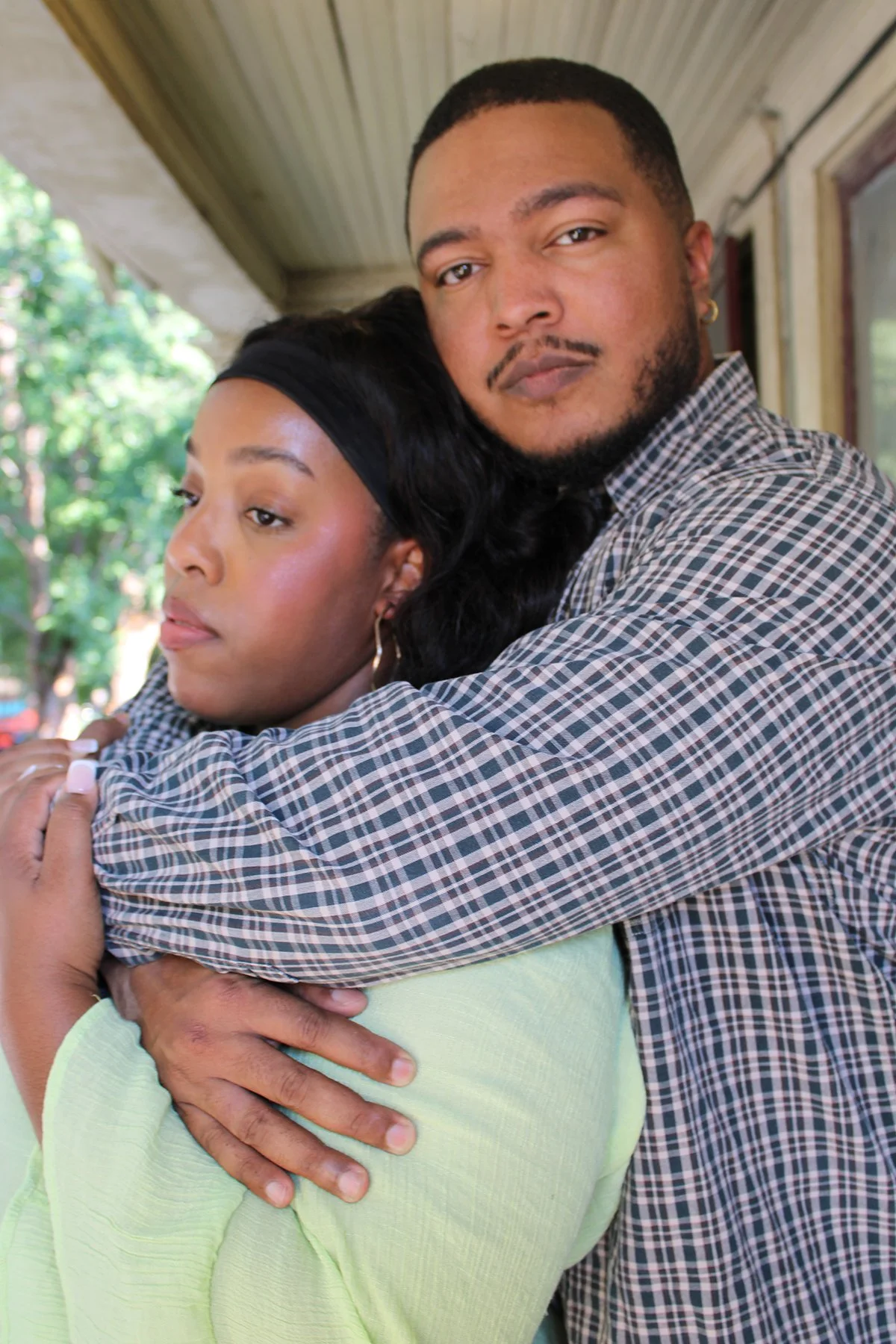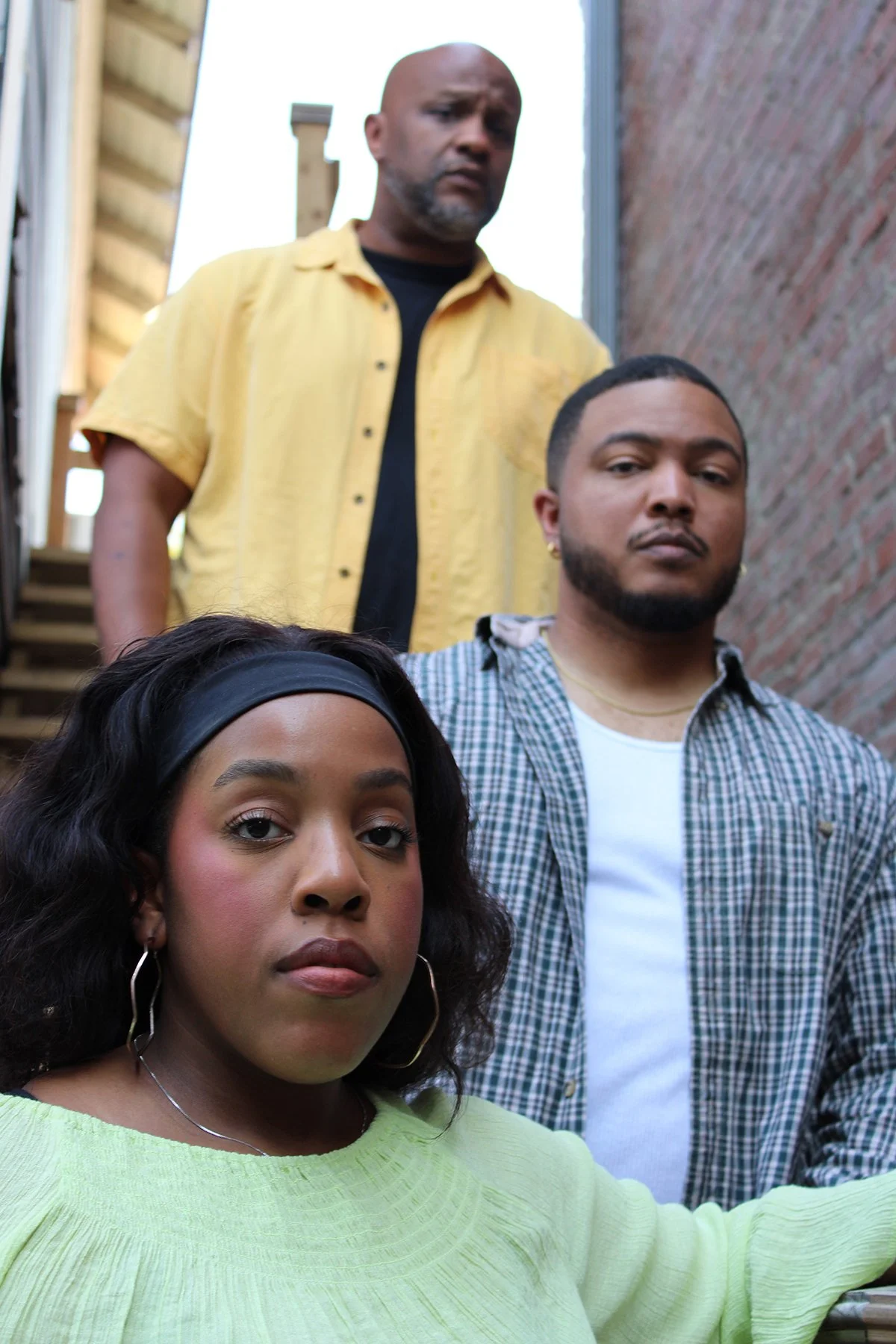‘King Hedley II’ from Bishop Arts & Soul Rep (@ BATC)
Photos by Anyika McMillan-Herod
—Rickey Wax
The stage opens under a wash of royal purple—a color long tied to majesty, faith, and mourning. It’s a striking image that immediately situates August Wilson’s King Hedley II within a bruised kind of nobility. Scenic designer Gabrielle Malbrough’s backyard set tells a story of survival before a single word is spoken: worn red bricks, black crates used as makeshift furniture, and a lone tree stump that serves as a throne where characters sit to wrestle with life’s riddles. The Hill District—once a thriving Pittsburgh neighborhood—is now a wasteland haunted by the fallout of the 1980s crack epidemic. Yet, as Wilson reminds us, even in barren soil, people still try to plant hope.
Director Jemal McNeil approaches this material with sensitivity and purpose, shaping moments of lyricism and quiet grit. The music, especially one character’s soulful nod to Aretha Franklin, becomes a bridge between scenes; it’s a reminder that the African American experience has always found rhythm in resistance and melody in survival. Troy Carrico’s lighting design deepens the intimacy of the stage space at Bishop Arts Theater Center, with warm amber hues following the actors even into the aisles, transforming the entire space into part of the neighborhood. For a moment, it feels like everyone’s just hanging out on the porch, swapping stories and weathering life together.
Set in 1985, King Hedley II follows an ex-con named King, played by Brian Gibson, who’s determined to rebuild his life and reclaim his dignity in a world that keeps moving the goalposts. Gibson brings rough-edged intensity but also charisma and empathy, allowing us to feel for a man trapped by circumstance (that one cousin from the cookout you keep telling to do better, but you know he’s too stubborn to listen). With his friend Mister—portrayed by Jamal Sterling, whose natural comedic rhythm makes even heavy lines land with ease—King dreams of opening a video rental store, scraping together money by selling stolen refrigerators from his backyard. Mister carries a drumstick, a symbolic heirloom from his father’s musical past, a small reminder that legacy can comfort or burden depending on how it’s held.
King’s girlfriend Tonya, played by Olivia Lewis, radiates a weary tenderness. Her nurturing energy clashes with her fear of bringing another Black child into a world that keeps taking more than it gives. King’s mother Ruby, portrayed by Anyika McMillan-Herod, moves through her scenes with silky ease, her soft voice and unhurried body language suggesting a woman who’s learned to float through chaos with grace and fatigue. When her former lover Elmore—played by Jerrold Trice, who nails the smooth-talking salesman (or gigolo) persona—returns with charm, danger, and a long-buried secret, the past begins to unravel before our eyes.
Their shared secret—about King’s lineage and the wounds passed down through blood—unfolds with the inevitability of Greek tragedy. (If Sophocles had set Oedipus Rex behind a boarded-up row house, it might have sounded something like this.) Wilson threads the mythic through the mundane, showing how generational pain, like fate, has a way of circling back until someone is forced to face it.
Hovering above it all is Stool Pigeon, played by Dennis Raveneau, who anchors the play like a living griot. A ragged historian, part preacher and part prophet, he scavenges through the ruins of the neighborhood, collecting discarded newspapers as if they were sacred texts. Raveneau’s performance rises above realism into something spiritual, his gravelly voice carrying both humor and heartbreak. When he laments that people are “wandering all over the place,” it hits differently today, echoing how gentrification, incarceration, and neglect continue to erase the very communities that once built the American dream.
Wilson’s writing carries a weight that few playwrights attempt and even fewer sustain. His dialogue unfolds like a sermon interrupted by poetry. It’s language that demands patience, and while the pacing occasionally drags (this play is, after all, more conversation than action), the words themselves are the true drama.
On preview night, some moments needed tightening, but the production’s spirit was undeniable. It shows us a world where salvation might come through planting a seed, telling a story, or simply refusing to vanish.
In the end Soul Rep’s and Bishop Art’s co-production of King Hedley II stands as both lament and celebration: a requiem for lost dreams and a testament to a people who keep dreaming anyway. It reminds us that the African American journey, like Wilson’s purple sky, is at once royal and restless, divine and deeply human.
WHEN: October 9-October 26, 2025
WHERE: 215 S Tyler St, Dallas
WEB: for tickets, visit: bishopartstheatre.org





